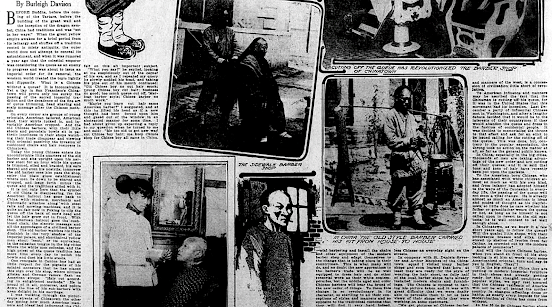The 1911 Chinese overthrow of the Qing dynasty led by Sun-Yat Sen not only established the Republic of China, but had a big impact on barbers, both in S.F. and China, as Chinese men began cutting off their queues or "pigtails" that the Manchus had imposed on the Han Chinese men as a sign of allegiance.
The queue was a hairstyle worn by the Manchu men from central Manchuria who invaded China during the Qing dynasty. The Manchu required Han Chinese men wear a queue which consisted of the hair on the front of the head being shaved off above the temples every ten days and the rest of the hair braided into a long ponytail. The hairstyle was compulsory for all males and the penalty for not complying was execution for treason. In the early 1910s, after the fall of the Qing dynasty, the Chinese no longer had to wear it.
A San Francisco newspaper described the impact of the regime change on the consequences for Chinese barbers as shown in excerpts from the San Francisco Call in 1911.
In contrast to Chinese men voluntarily cutting their queues in 1911 as an expression of freedom from the mandate of the Manchu rule, the cutting of queues imposed by whites during the late 19th century was humiliating if not emasculating.
In April 1878, Ho Ah Kow was arrested and fined $10 in San Francisco for violating the “cubic feet” ordinance, which required there be 500 cubic feet of space per occupant of a room, a law that was designed to limit the number of Chinese living within a room. While in jail, Sheriff Nunan also ordered that Ho's queue be cut off. After his release from jail, Ho Ah Kow enlisted the support of the Chinese Six Companies to sue Sheriff Nunan for $10,000 for damages. Ho Ah Kow v. Nunan, 12 F. Cas. 252 (C.C.D. Cal. 1879)
California Supreme Court Justice Stephen Field decided the case in an opinion that had a far-reaching and historic impact on the rights of Chinese immigrants, ruling that the Queue Ordinance was a form of additional punishment within the “cubic feet” law, which the Board of Supervisors did not have the authority to enact. The judge, who was opposed to Chinese immigration, nonetheless ruled in Ho's favor, noting that the Queue Ordinance was clearly aimed at the Chinese and was, therefore, a violation of the right to equal protection under the law for “all persons,” not merely “all citizens.” Finally, because of the specific disgrace imposed upon the Chinese, the law was deemed a form of “cruel and unusual" punishment.
The San Francisco Wasp lampooned the issue with a drawing of Justice Fields dressed in Chinese clothing and sporting his own queue. It showed him in “Justice Field’s Barber Shop,” braiding the hair of a Chinese man, under a picture of Sheriff Nunan having just finished using scissors to clip a queue.






No comments:
Post a Comment